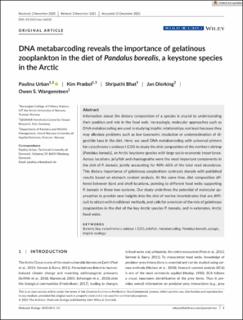DNA metabarcoding reveals the importance of gelatinous zooplankton in the diet of Pandalus borealis, a keystone species in the Arctic
Peer reviewed, Journal article
Published version
Permanent lenke
https://hdl.handle.net/11250/2999967Utgivelsesdato
2021Metadata
Vis full innførselSamlinger
Sammendrag
Information about the dietary composition of a species is crucial to understanding their position and role in the food web. Increasingly, molecular approaches such as DNA metabarcoding are used in studying trophic relationships, not least because they may alleviate problems such as low taxonomic resolution or underestimation of digestible taxa in the diet. Here, we used DNA metabarcoding with universal primers for cytochrome c oxidase I (COI) to study the diet composition of the northern shrimp (Pandalus borealis), an Arctic keystone species with large socio-economic importance. Across locations, jellyfish and chaetognaths were the most important components in the diet of P. borealis, jointly accounting for 40%–60% of the total read abundance. This dietary importance of gelatinous zooplankton contrasts sharply with published results based on stomach content analysis. At the same time, diet composition differed between fjord and shelf locations, pointing to different food webs supporting P. borealis in these two systems. Our study underlines the potential of molecular approaches to provide new insights into the diet of marine invertebrates that are difficult to obtain with traditional methods, and calls for a revision of the role of gelatinous zooplankton in the diet of the key Arctic species P. borealis, and in extension, Arctic food webs.

